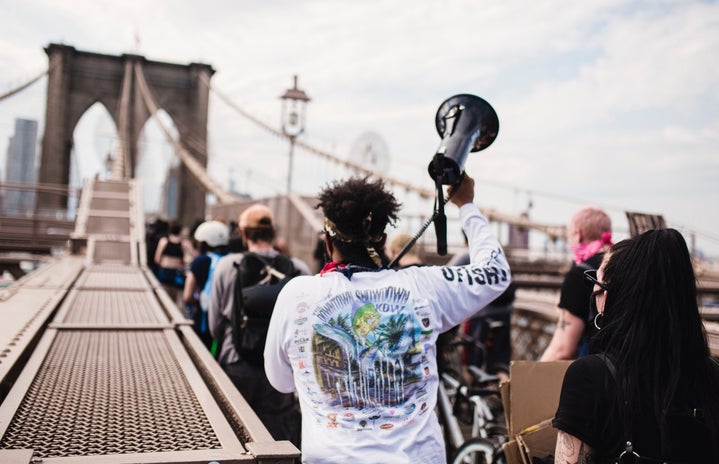In 2020, the COVID-19 shifted the work culture during March and April due to a wave of layoffs and the emergence of a virtual workspace. As of January 2022, the work culture is now shifting in a new direction as the country faces another sort of labor crisis as a record-breaking amount of Americans are now quitting their jobs.
From customer service to office jobs, many people refer to this surge of unemployment as “The Great Resignation,” while others dub it as a much bigger change, called the “Anti-Work Movement.” Particularly with Generation Z, the growing philosophy within social media and internet communities encourage people to leave the traditional, and often toxic, work culture to pursue a lifestyle decentering work and hustle culture.
The biggest force empowering this movement is social media. TikTok and Twitter have user platforms that demonstrate their support for the movement and share their experiences quitting their jobs and searching for more liberating ventures such as side hustles or online businesses.
Most notably, there is the social platform Reddit, with the quickly growing subreddit “Antiwork.” The subreddit describing itself as a space dedicated to “those who want to end work, are curious about ending work, want to get the most out of a work-free life, want more information on anti-work ideas and want personal help with their own jobs/work-related struggles.” The subreddit has over one and a half million subscribers, and continues to spread messages encouraging workers to leave work environments where they are overworked or underpaid. The thread contains information regarding worker strikes, corrupt management, and often the immoral business practices that occur in the workplace.
With the help of social media, these waves of strikes and protests gain more visibility and solidarity for workers that refuse to stand for being exploited and underpaid for their labor. In recent news was the Kellogg strike, where nearly 1,500 workers went on strike against Kellog’s cereal plants due to unfair wages and labor contracts. This union protest brought in an influx of media support, especially through social media with TikTok, Instagram, and Twitter. The “antiwork” subreddit documented the protests as they took place, and when attempting to get new employees to replace strikers, the company dealt with social media users spamming their job portals with fake applications. Eventually, the 77-day protest ended and the workers were able to vote for a new labor contract.
More and more corporations faced labor strikes and backlash for immoral business practices throughout 2021, and with the surge of social media, these protests continue to gain more attention and power the growing Anti-Work Movement.
Our elders might believe that our generation is the one that’s “lazy” or “unwilling to work,” but this movement proves that we are anything but. Gen Z demonstrates that they are able to put in the hard work, such as through social media anti-work campaigns and their influx of fake applications to Kelloggs. Our generation adds onto a decades-old fight to bring justice for the working class to a new level through their use of social media to argue that no one should submit to the often corrupt corporate practices that occur in our workplaces. With the growth of social media among not only people, but with businesses and news sources, Gen Z can utilize its powers to light the beginnings of a genuine change for the conditions of our nation’s workforce and laborers in the pursuit of social justice.
There are many reasons as to why people continue to quit, varying from toxic management, to miniscule pay for overqualified workers, or the exploitation of workers in general. From a young age, people are fed the idea that if you just chose to work hard at our jobs that it would simply pay off in the end, most commonly in the idea of the “American Dream”. For me, being a daughter of immigrants means this “American Dream” is something eminent in the minds of my family and as I grew up, I realized how this “Dream” is nothing more than a myth designed for workers to believe that if they work constantly without taking breaks and without demanding an appropriate salary, this would get them noticed and propel them to success. The hard truth is that this is a trap for workers to continue working under unfair working conditions without complaint.
Although I’ve only worked in some part-time restaurant jobs as a teenager, I’ve noticed the pattern of bosses not paying attention to whether their employees get breaks, or pressure them to work more shifts then they need or perform more tasks than their job position requires. I’ve seen with family members and friends with full-time jobs who receive the same treatment. So yes, hard work is important to get you where you want to be, but when put in the hands of toxic work management, it becomes a work culture that is unacceptable.
This anti-work message Gen Z spreads on social media teaches us that we do not have to subject ourselves to overworked schedules and insufficient pay just to survive. The campaign represents every worker — meaning it is a movement for the people to understand that we can embrace liberation from toxic work environments. With the makings of this “Anti-Work” movement, we start to see the beginnings of a growing wave of change to make genuine strides towards better working conditions and futures for all workers.


